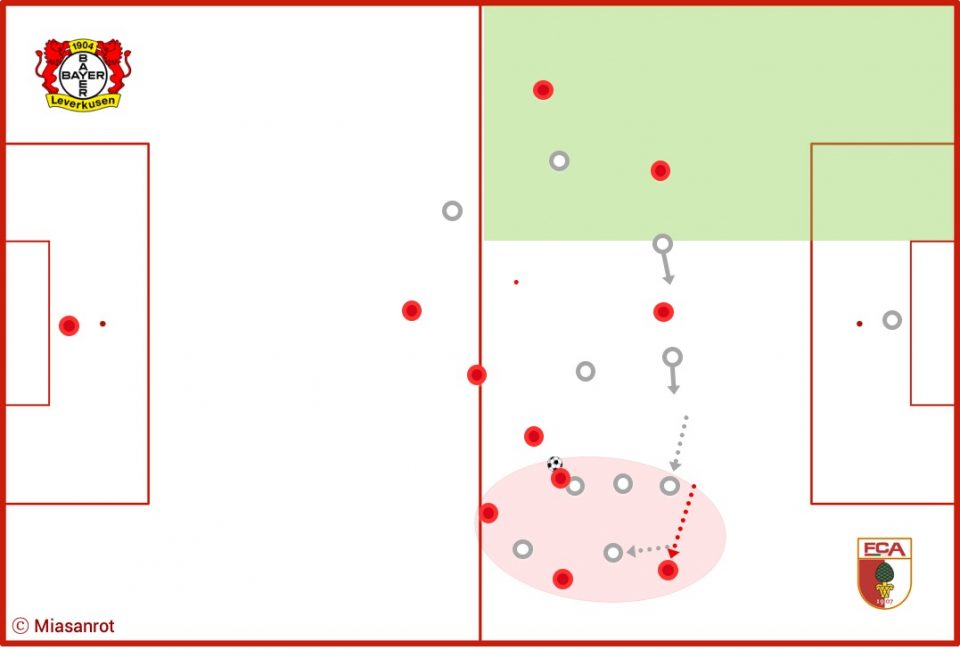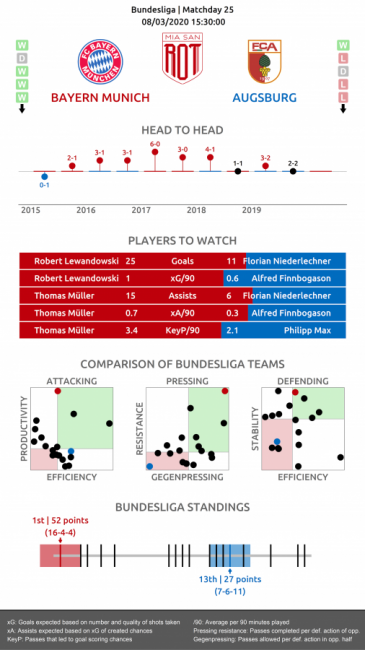Bundesliga MD 25 Preview: Bayern against Augsburg
The year is 2020. All of Germany can only stand by and watch as Germany’s record champions’ unstoppable march towards the Bundesliga title continues apace. All of Germany? Not quite! One small Swabian town in the Bavarian South West stubbornly resists the advance of their mighty neighbors from the state capital. And they continue to make life hard for the Bavarian legions…
For whenever the small Swabians from Augsburg faced the big FC Bayern from Munich lately, things did not always turn out as expected: A 1-1 draw in the Allianz Arena in September 2018, a narrow 3-2 victory for Bayern at Augsburg in the reverse fixture later that season, and a 2-2 at the same place on matchday 08 of the current season.
For these last three games, Augsburg was actually something of a small and rebellious Gallic village that proved a constant thorn in the side of their imperious neighbors. Before that, however, Augsburg suffered heavy defeats, especially away to Bayern. In all, Bayern’s home record against Augsburg speaks for itself: 12 wins, one draw, two defeats.
FC Augsburg: Bayern a springboard once more?
This devastating record notwithstanding, coach Martin Schmidt will certainly do everything in his power to continue what is, from his point of view, a fairly good run against the serial champions – and to end their own bad one in the league. Augsburg has won only four points from their last eight Bundesliga games: Only Werder Bremen (3) fared worse over the same period.
Those who hold with Augsburg can point out that their opponents with RB Leipzig, Borussia Dortmund, Union Berlin (away), Eintracht Frankfurt, SC Freiburg, Bayer Leverkusen, Gladbach, and Bremen were an exceptionally difficult group to face. Of these matches, they could only win the contest with table neighbors Bremen. To a certain extent, there is also an analogy to the first half of the season. Back then, Augsburg could only one win one game until matchday 11, but managed four draws – one of them against Bayern.
Then Augsburg suddenly started a series of six undefeated games in a row. They beat Paderborn, Hertha, Mainz, Hoffenheim and Düsseldorf, and drew against Cologne. The question is: Can Augsburg do the same trick twice? Can they use the match against Bayern to make a comeback? And if so, how?
Coordination problems
In terms of formation, Bayern should expect Augsburg to start in one of the following two ways: Either in a 4-1-4-1 or a system with a flexible back five. The latter would probably give Augsburg greater defensive stability, as evidenced most recently against Leverkusen. Either way, Augsburg is generally not known for pushing up high. Instead, they prefer to play with a compact and aggressive midfield pressing. However, their back five has not yet appeared to be perfectly balanced. The Swabians have had their problems especially in dealing with fast switches of the play across the pitch.
Augsburg’s wide defensive positions have been a weak point of the team throughout the season. It has been far too easy for the opposition to draw Augsburg’s full-backs out of position and thus open the way for their own attackers. This also regularly gets their teammates into trouble, as this reconstructed situation from the second half against Leverkusen demonstrates:

Leverkusen overload the right side and thus provoke that Augsburg’s left-back, Philipp Max, moves out (bottom grey arrow). As a result, the left center-back feels compelled to shift outside along with Leverkusen’s player to maintain cover. This small (wrong) decision in turn leads to the rest of the defensive line following suit.
But Max is not the only person to blame here. In the area marked in red, one of Augsburg’s central defenders stands between his own defensive line and the Augsburg player attacking the ball. In this situation, there is no benefit at all from him being there. A few seconds before this snapshot, however, he felt responsible for doubling up on Leverkusen’s player on the ball. When he realized that this was pointless, it was already too late. The chain of decisions described above was already in full swing, Leverkusen switched the play (actually much too slowly) and created a big chance down the left flank.
Attack stellar, defense cellar
Now one might accept this as one of the small but vital differences when a smaller side plays a bigger team. But Schmidt’s Augsburg shows such weaknesses more regularly, regardless of the opponent. Augsburg still has a six-point advantage on the relegation play-off place. But if they don’t manage to eliminate their coordination problems, it will be difficult for them not only away at Bayern, but more generally with respect to staying up.
Augsburg has great potential and can be extremely unpleasant for any opponent. Especially by intelligent switches of the play, they often succeed very well in creating a goal threat. In attack, they have a striker in Florian Niederlechner who has been a consistent goal scorer in the Bundesliga for years. He certainly is an important factor in their main quest for the season: Avoiding relegation. But Alfred Finnbogason, the very offensively-minded Philipp Max, and right winger Marco Richter are also capable of hurting any Bundesliga team in counter-attack situations.
Augsburg has scored the seventh most goals in the league (36), but they also have conceded the fourth most (50). And it is this imbalance that has ultimately let them down, despite a good squad.
FC Bayern and the integration of Thomas Müller
But perhaps they will have enough for a respectable win against Bayern, even if this seems unlikely in light of the current form of the record champions. Nevertheless: Schalke showed on Tuesday evening that the side from Munich is not invulnerable. Especially without Robert Lewandowski, Hansi Flick’s team lacked coordination in attack. In a new episode of “Mia san Rotstift”, we analyse the problems the record champions had with a deep sitting Schalke side:
Augsburg will be waiting for Bayern’s turnovers of the ball as mentioned here and possibly build up with greater precision than Schalke was able to. Moving Joshua Kimmich back to midfield could be crucial for Bayern to regain control of the game. Above all, however, it is Thomas Müller’s runs that can be a great weapon against Augsburg.
Augsburg’s previously explained coordination issues and Müller’s space-opening runs could present a similarly big conundrum to Schmidt’s team as they proved to be for Hoffenheim last weekend. In that match, Müller managed to draw the right-back inwards several times, which opened up spaces on the wing for shifts of the play.
But Flick also needs his team to capitalize on these openings. Against Schalke, too often someone was missing who would push up into the open spaces. This is something Joshua Zirkzee, who seemed to harmonize perfectly with Müller in the game against Hoffenheim, is able to do, which makes it not entirely unlikely that the coach will give him his second start.
Focus, presence, intensity
For Bayern, it is all about winning at the weekend. On their way to the eighth championship in a row, it is the many little things that add up in the end. Although they were able to increase the lead over Leipzig last weekend, this does not yet mean much in view of the remaining fixtures of both clubs.
We write the year 2020. And the question is whether all of Germany can only stand by and watch as Germany’s record champions’ dominance continues. One small Swabian town wants to offer resistance and help that the Bavarian legions may yet be repelled on their way to their eighth Bundesliga title in a row.
Whether they succeed depends on many factors. The most important one is probably how concentrated FC Bayern will be in going about this necessary chore. After all, to maintain the same high levels of intensity and focus all the time is almost impossible. Not least the game against Schalke clearly showed this. But the fact that Bayern can still win this type of match more or less at a canter at the moment clearly speaks for them.










